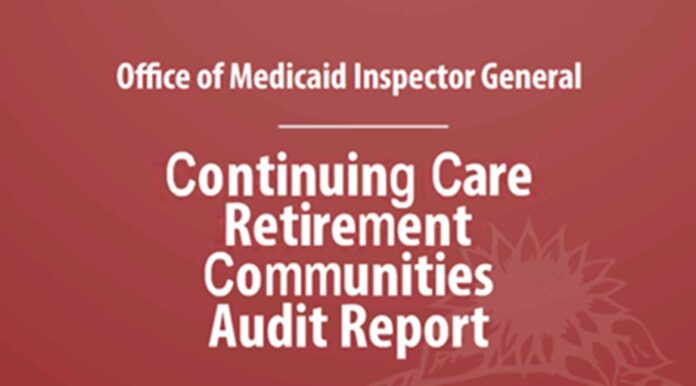A new audit suggests the state lost $88 million in bed taxes over four years for skilled nursing centers because the state Insurance Department didn’t ensure they filed required paperwork when registering or renewing a certificate to operate.
Medicaid Inspector General Steve Anderson issued a report that concludes these nursing centers received a reduced tax rate – and maybe shouldn’t have – because they didn’t sufficiently document they qualified for the lower rate as a continuing care provider.
“Lenient oversight allowed numerous nursing homes to qualify as continuing care facilities without sufficient evidence that they met the requirements for the reduced rate,” Anderson said in statement issued with the report.
The Insurance Department rebuked the report, disputing that the state lost $88 million in revenue and saying the audit should be discounted nearly entirely.
In its response to the audit, the agency said the inspector general reached “flawed conclusions based upon unreliable extrapolations” and was “overreaching in scope.”
The agency said the audit lacked an understanding of the senior care market, “misinterpreted and misapplied the law” and demonstrated a lack of understanding of the Insurance Department’s authority.
The inspector general’s report zeroed in on whether continuing care providers were filing the proper paperwork with the Insurance Department to qualify for a $818 bed tax rate in favor of a more expensive $4,908 bed tax if they weren’t certified.
The inspector general reviewed applications approved by the Department of Insurance from 2020 to 2023 and found an error rate of about 68%.
The initial registration – required to get the $818 bed tax – includes an application, a disclosure statement, continuing care contracts, fee schedules, a certified financial audit and a $50 registration fee.
The renewal requirements are the same except the fee is $25. The certified financial audit is due within four months of completion of the provider’s fiscal year.
Once the material is received, the Insurance Department sends providers a letter notifying that their certificate has been renewed.
Insurance officials say they are not required to undertake any inspections of the facility, only to accept the required paperwork.
The state Department for Aging and Disability Services is responsible for assessing the facilities for quality of care.
The inspector general reviewed application files for the continuing care providers and found 285 incomplete registrations out of 419 processed for the audit – an error rate of 68%.
The report said the most common required item missing from the files was a yearly audit, central to accounting for the financial stability of a care provider.
The audit found that the Insurance Department sent registration and renewal letters to providers stating the approval depended on receiving the audit.
But the inspector general said very few files from the Insurance Department contained the required audit.
In an interview, Anderson said the state didn’t collect the full $4,908 in bed taxes because they weren’t categorized as a continuing care provider when they didn’t submit their paperwork properly.
“Some of them – if they had their paperwork in on time, if they had the required audit, all of those things – probably would have been properly categorized as a continuing care provider and would have got the reduced rate,” Anderson said.
“But they didn’t meet the requirements. They didn’t have their audit. They were not timely,” he said. “They didn’t meet those. They were improperly given that status.
“Our deal was they didn’t meet the requirement, so therefore they weren’t entitled to the rate,” he said.
As important as the audits are in determining whether those facilities have the financial wherewithal to provide services to the public, he said there is nothing in law that required the Insurance Department to conduct a detailed review of the documents it received.
“Even if they had sent in bogus financials, as long as they looked good, they would have got the reduced rate,” he said.
Anderson noted in his audit that providers have ignored the definition of “continuing care” as it related to the bed tax.
The report said Kansas law does not define the phrase “continuing care,” resting essentially on the federal definition.
When combined with the lack of “appropriate oversight” by the Insurance Department and the Department for Aging and Disability Services, the audit said the state lost about $33 million in revenue because providers received the lower tax.
The $33 million was part of the overall $88 million highlighted in the report.
Anderson recommended that responsibility for management and oversight of continuing care provider registration applications be moved from the Insurance Department to the Department for Aging and Disability Services.
He recommended that the staff responsible for processing the registration applications for continuing care providers include a certified public accountant, who could flag any problems in the required financial documentation.
“Those certified audit reports are very important,” he said.
He also recommended the Legislature come up with a new definition of “continuing care retirement community.”
The inspector general calculated the losses by combining bed counts for each skilled nursing facility that submitted an incomplete application approved by the department.
The report totaled that up to be 21,301 bed and then multiplied that by $4,090 – the difference between rates of $4,908 and $818 – to come up with $87.1 million.
The Insurance Department said the inspector general took a “simplistic, yet overly harsh approach” to conclude the state may have lost $88 million in bed taxes.
Using the inspector general’s approach, if an audit was provided to the agency one day late after the provider’s fiscal year ended, the senior living center should not have qualified for the lower bed tax.
“Many of the entities identified by MIG as noncompliant were simply late in providing the audit,” the Insurance Department said in responding to the audit.
“Providing the audit within four months of the completion of the entity’s fiscal year is a challenge,” the agency said.
“The problem is further complicated by the fact that many providers are part of a larger holding company or management structure involving several registered providers with different fiscal years,” the department said.
In these cases, the department said the holding or management company has consolidated financials reflecting complex accounting and organizational structures, and the audit takes longer than what is contemplated by state law.
The department acknowledged that are instances of applications being approved without the audit, but said that has not deprived the state of $88 million.
The department said it recognized this as an issue before the audit when it explored the possibility of moving oversight of the continuing care providers to the Kansas Department for Aging and Disability Services.
There is now a bill pending in the Legislature that would that move oversight to KDADS while writing a new definition for continuing care. The bill is now in a conference committee.
Republican state Rep. Brenda Landwehr, chair of the House health committee, has advocated for the bill.
She raised the possibility that the state could be losing bed tax money because of a facility masquerading as a continuing care provider.
Landwehr said it made more sense for KDADS to assume oversight of registering and renewing continuing care provider certificates.
She said the the bill would give KDADS a better ability to sniff out bad actors that might improperly gain access to lower bed taxes.
In an interview, Landwehr said that while she believes the state has lost bed taxes, she said the Insurance Department wasn’t to blame.
“The way the law was written to have the Insurance Department oversee this program did not give them authority to do anything or act on anything,” Landwehr said.
“Did the state lose money? Yes they did,” she said. “It’s not dereliction upon the Insurance Department. It’s on the law that was done.
“It’s why we’re moving it so we can put it over at KDADS where it belongs and give it some teeth so they can enforce any of these bad actors claiming to be one thing when they’re not,” Landwehr said.
The registration for certificates dates back to 1989, and the agency said that the industry has indicated that previous administrations didn’t enforced the annual audit requirement.
The department said that under the direction of current Commissioner Vicki Schmidt, it has more closely scrutinized applications and have required audited financials to be provided as a condition of new and renewal applications.
The department said has it issued administrative action against entities that have failed or refused to provide audited financials.
In June 2023, the Insurance Department sent a memo to Landwehr and Laura Howard, secretary for KDADS, voicing support for the move.
In the memo, the agency suggested moving the registration of continuing care providers over to KDADS.
“The department is not involved with the quality of care assessments performed through KDADS nor with the federal aspect of Medicare or Medicaid,” the memo said.
“Because of a lack of substantial nexus to insurance, the Insurance Department supports exploring moving the registration requirement to an agency that more closely regulates these providers,” the memo said.
“This would reduce the number of agencies a provider must interact with and would create efficiencies,” the memo said.















